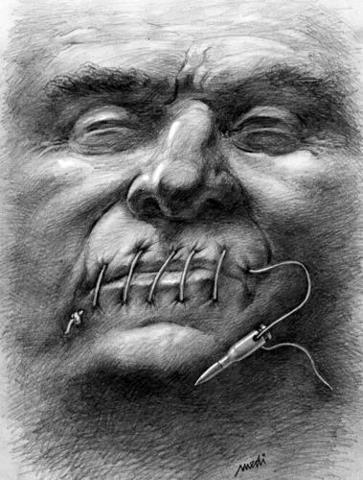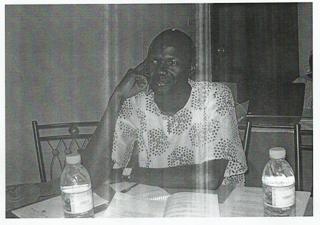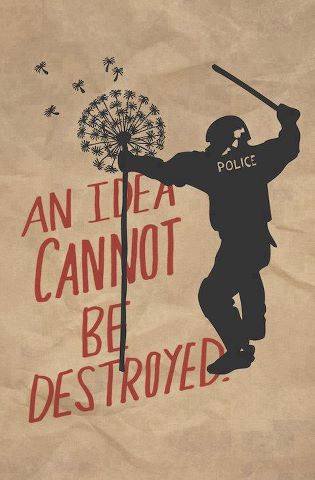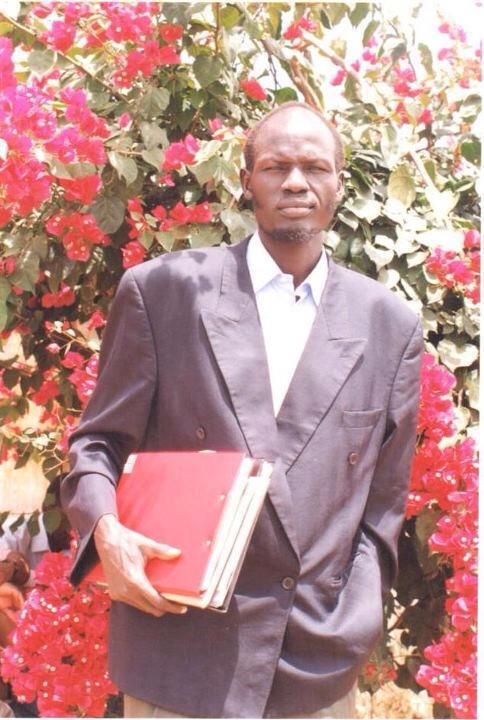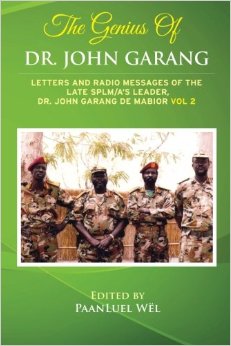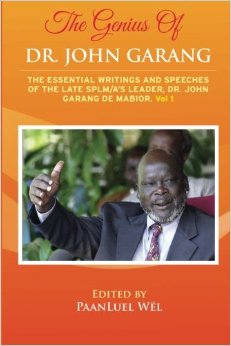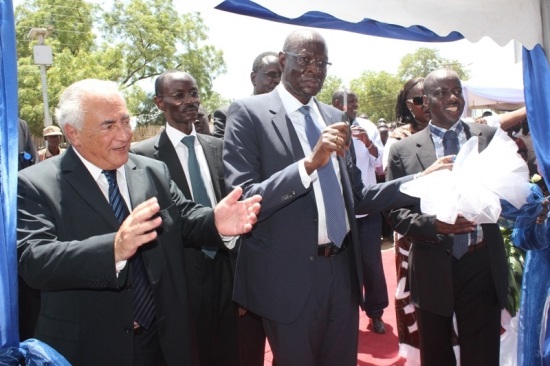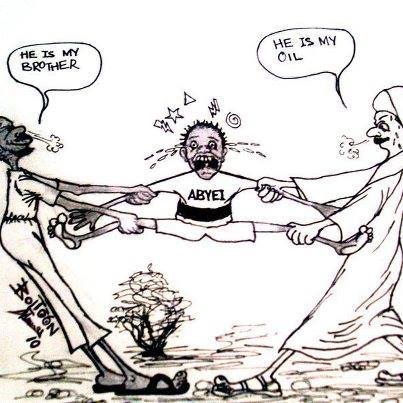How President Kiir Set Himself Up for Trouble
By PaanLuel Wël, Kampala, Uganda
One month into the political, military and humanitarian crisis in South Sudan, and peace is still a distant chimera to the beleaguered souls caught up in the vicious conflict across the country. One glimmer of hope, so far, is that the recently drafted (and signed) agreement on cessation of hostilities between the Government of the Republic of South Sudan (GRSS) and the Sudan People’s Liberation Movement/Army in Opposition (SPLM/A in Opposition) would offer a viable solution to the burgeoning conflict in South Sudan.
In the event that the “Draft Agreement on Cessation of Hostilities between the Government of the Republic of South Sudan (GRSS) and the Sudan People’s Liberation Movement/Army in Opposition (SPLM/A in Opposition)” is endorsed (and respected) by both parties, the next step would be to find a feasible political solution to the military and humanitarian crisis in the country.
Surely, much will depend on the hard political and military compromises that the GRSS under President Kiir and the SPLM/A in Opposition under Dr. Riek Machar are, and will be, prepared to make. But if the post-1991 Nasir Coup negotiations between the SPLM/A under Dr. John Garang (led by James Wani Igga) and the Nasir group under Dr. Riek Machar (led by Dr. Lam Akol) are anything to go by, South Sudanese people will have a long way to go before trust and peace is restored, again, in their beloved country.
Failure to Prepare is Preparing to Fail: Political Doom Road to December 15th
The crisis that erupted on Sunday, 15 December 2013, was, and still is, a political crisis, not a military one, and should therefore be seen from the perspective, and solved within the prism, of South Sudanese political discourse. With the benefit of hindsight, one could argue that the current political crisis began way back in 2005—15 July 2005, to be precise—when the late SPLM/A leader, Dr. John Garang, reconfigured the SPLM/A Leadership in preparation for the post-CPA era, by dissolving all the SPLM institutions—The SPLM Political Bureau, the SPLM National Liberation Council, the SPLM National Executive Committee and the SPLA staff command structures.
Failure to reconfigure the SPLM/A leadership, Garang had reasoned, would have meant that the “composition of the Government of Southern Sudan would logically follow the rank in the SPLM/A Leadership Council in total disregard to merit and other considerations.” In other words, appointment would have been based on the bush seniority within the SPLM/A irrespective of merit and experience, gender equity and ethnic consideration. Reportedly, Salva Kiir was outraged by Garang’s decision to dissolve the SPLM/A Leadership Council, and he strongly condemned the Chairman. When Salva Kiir took over as the SPLM/A Chairman, President of GOSS and the First Vice President of the Republic of the Sudan, after the death of Dr. John Garang, his first official decree was an immediate reinstatement of the dissolved SPLM/A Leadership Council.
Over the years—prior to and after the independence of South Sudan—President Kiir has been appointing government officials virtually from the wartime SPLM/A Leadership Council—the SPLM Politburo and the SPLM/A National Liberation Council, plus the SPLA. Over the years President Kiir has been appointing and dismissing these powerful members of the party as his “constitutional prerogatives” dictate. While there have been “Thank-giving” parties whenever he decrees in ministers, assistant ministers or other government appointees, there have also been grudges and bitterness whenever he decrees them out. And because these are the same members—of the SPLM Politburo and the National Liberation Council—charged with the election of the party leader/chairman, it was just a matter of time before the dismissed members would gang up and exact their political vendetta on the President—and they did, much to the tripedation of the entire country.
All that these embittered members needed to avenge their dismissal was a tool to use against the President. That is how Dr. Riek Machar came into the picture. Dr. Machar is blessed with a strong dosage of high political ambitions, and thus he is invariably on the lookout for political opportunities to exploit. Not only that, he had his own political grudges to settle with the President. In the lead up to South Sudan independence in 2011, for instance, President Kiir had given the impression, or so thought Dr. Machar, that he would voluntarily retire to his Akon village in Warrap State as soon as South Sudan’s independence was declared. Dr. Machar was visibly elated and strove to make it his habit to make it known to anyone—most of whom were the expats community he was dying to endear himself to—with time and ear to listen to his recital that “he is the next President of the Republic of South Sudan.” Ngundeng might have been right after all, he must have thought to himself.
After independence, however, President Kiir—prompted by Dr. Machar’s and the expats community’s endless talk of his immediate and unconditional political departure to his home village of Akon—made it publicly clear that there was no vacancy at the Presidency and anyone who want the seat must wait for his/her time. South Sudan has never been the same again, since that day. The charismatic and fiercely nationalistic SPLM Secretary General, Pagan Amum, and the loquacious Mother of the Nation, Madam Rebecca Nyandeng, both of whom have been positioning themselves to take on Dr. Riek Machar—the duo, like Dr. Machar, were convinced beyond any reasonable doubt that President Kiir meant his words when he promised to retire after serving one term—were thrown into total political confusion. Instead of Dr. Machar, it was President Kiir that they turn their blazing guns on.
Dr. Machar, Pagan Amum and Madam Nyandeng—in collusion with the disgruntled, former cabinet members dismissed by President Kiir—ganged up in preparation for the SPLM party National Convention. Each of these individuals—Dr. Machar, Pagan Amum, Madam Nyandeng and the disgruntled ex-members of Kiir’s cabinet—had their own respective political grievances to settle with the President. It was a marriage of political convenient conceived in hell. President Kiir, finding himself outnumbered and outmaneuvered within the SPLM Politburo, panicked and called off the party National Convention. He called it off again and again and again, hoping to buy time and possibly salvage his dwindling political fortune. Dr. Machar, Pagan and Nyandeng overtly came out questioning President Kiir’s ability to manage the country, upping the political pressure on the President, prompting him to dismiss his entire cabinet in July 2013. Pagan Amum, the vocal Party Secretary General, was suspended and placed under House Arrest—he was barred from talking to the media or leaving the country. Dr. Machar was dismissed from the post of the Vice President; however, it had to be done indirectly—sacking of the entire cabinet—for fear of engendering a tribally motivated negative and/or violent reaction to his dismissal.
But the dismissal of the entire cabinet, majority of whom never made it back to the government, only increased the numbers of President Kiir’s enemies within the SPLM Politburo, the very organ charged with electing the party chairman. The exact trouble that Dr. John Garang had attempted to avoid had, by then, become the living nightmare for President Kiir. With the numbers of President Kiir’s political opponents burgeoning within the critical party structure—the SPLM Politburo—President Kiir’s hope of retaining his prized post of party chairmanship was doomed or so he had then concluded. Consequently, President Kiir undertook exactly the very action that he had, 8 years earlier, censured Dr. John Garang for: he dissolved all the SPLM party structures with the exception of his post—the chairmanship.
The dissolution of the SPLM party structures by President Kiir, unlike the one undertaken by Dr. John Garang in 2005, was meant to serve three main purposes: firstly, to get rid of the party organs, particularly the SPLM politburo, that have been taken over by his political antagonists; secondly to further frustrate his political opponents so as to force them out of the party, and thirdly, having rid the party of his political challengers, to restructure and reconstitute the party organs, staffing it with allies, to ensure his success at the party to-be-choreographed chairmanship contest.
To Kiir’s utter surprise, his opponents made it publicly clear that they would rather fight their political wars within, not outside, the party. Not only that, they went as far as accusing the President, in a televised Conference, of having abandoned the party vision, principles and mission in preference to taking orders from Khartoum, listing Kiir’s indifference to the conduct, and results, of the Abyei referendum exercise as the key case in point. President Kiir’s allies sardonically dismissed their Conference as a futile work of disgruntled political opportunists. “Growing disenchantment and international criticism created fertile ground for opportunists masquerading as democrats,” whispered President Kiir’s ally.
Incentivization of Violent Rebellion: Military Doom Road to December 15th.
As President Kiir’s bungled wrestling with his political foes within the ruling SPLM party widened and heightened, he turned to the army to leverage its influence for his own political survival. But to his dismay, the army—including his own Presidential Guards—was numerically dominated by soldiers from the Nuer ethnic group, the community his main nemesis, Dr. Machar, hails from. Again, the domination of the army by one ethnic group, like President Kiir’s failure to steer the main organ of the party to his favor, was a lapse of reasoning and a case study of poor foresight on the part of the President. Like most perils confronting President Kiir these days, it all goes back to the time of Dr. John Garang, when the late SPLM/A leader, on the eve of CPA, commenced South-South Dialogue and Reconciliation Process. The SPLM/A—convinced that there would never be a long lasting peace, political stability and sustainable economic development in South Sudan with Khartoum-backed militias strolling the countryside—undertook a serious and sincere peaceful dialogue to strike political and military solutions to the problems among Southern Sudanese.
When President Kiir took over from Dr. John Garang in August 2005, he continued and even sped up the South-South Dialogue—much to his credit and legacy in the eyes of most South Sudanese people who have long borne the brunt of the wars. But President Kiir strayed away from one fundamental principle of Dr. John Garang: while Dr. John Garang wanted to politically and militarily integrate the various militias in his own (SPLM/A’s) terms, President Kiir, in what appeared to have been, and continued to be, his eagerness to please, gave in and politically and militarily integrated the militias on their own outrageous terms, much to the consternation of the historical SPLM/A members. And because these Khartoum-armed and –backed militias were overwhelmingly from the Nuer ethnic group—and more so because these militias negotiated and were integrated as separate independent groups and at various times—the SPLA (South Sudan National Army) ended up being dominated by soldiers from the Nuer ethnic community.
It wasn’t so much the goal of these Nuer warlords and militias to take over the SPLA, much less was it carried out as an insurance policy to support Dr. Machar—whom the militias have bitterly fought in the past as fiercely and mercilessly as they have fought the SPLM/A—in his future political and military contests against President Kiir as much as it was simply a self-interested act by the Nuer warlords eager to take home the highest political and military concessions they could squeeze out of President Kiir. In President Kiir the militia warlords got away with more than they had bargained for—military domination of South Sudan armed forces—the SPLA—particularly among the foot soldiers. Of particular interest to December 15th event was the ‘2006 Juba Declaration’ between the renegade militia leader, Paulino Matip, and the Government of Southern Sudan. President Kiir, as part of the deal, appointed Paulino Matip as deputy commander-in-chief of the SPLA, technically taking the bulk of his rebel militias into the elite Presidential Guards unit entrusted with protecting the President. Because of this single benign act by the President, soldiers from the Nuer ethnic group, like in the SPLA, dominated the Presidential Guards unit—the unit that triggered the current evolving civil war in the country.
President Kiir’s eagerness to give blanket amnesty to any militia Deng, Lado and Gatkuoth, instead of seeding long lasting peace, political stability and sustainable economic development across the country as he had hoped for, saw the inflation of violent rebellions, wanton death of civilians, destruction of property and political instability throughout the country. Blanket amnesty had incentivized violent rebellion. That is, in the words of Dr. John Garang, spoken in reference to Southern Sudanese relentless armed rebellion against successive repressive Khartoum regimes, “under these circumstances” in which President Kiir had specialized in granting blanket amnesty to any warlord Deng, Lado and Gatkuoth, “the marginal cost of rebellion in the [Republic of] South [Sudan] became very small, zero or negative; that is, in the [Republic of] South [Sudan] it pays to rebel.”
Thus the main cause of political instability—read armed rebellions—in South Sudan, prior to and after independence, has been the incentivization of violent rebellions in the form of blanket amnesty to any Deng, Lado and Gatkuoth. A mere glance at the composition of the previous and present government of South Sudan, both at the national and state levels, glaringly screams out one fact: there is an incentive to rebel. It pays to rebel and to kill innocent citizens! The sheer immense attractiveness of political reward for unprovoked revolts and ridiculous butchering of innocent unarmed inhabitants is what drive politic and guarantee easy access to both power and wealth in Juba. Where the rule of law is abandoned and political terror recognized and embraced, there is only one outcome: practical people will follow where incentives lead. That, exactly, has been and continues to be the stark reality we grapple with in South Sudan, a natural outcome of a systematic state policy sponsor and sustain by the government of South Sudan.
Sensitive and proud as all soldiers are, what did the President expect the likes of the SPLM/A war veterans to do having just witnessed NCP-allied militias they not-long-ago ferociously fought against being placed above them as their new bosses? The only logical course of action that any disillusioned and miserable soldier can do, of course: find a flimsy pretext, rebel, kill and maim, and then come back, threateningly, in the name of peace and political stability. The case in point is that of Gen. George Athor Deng, an SPLM/A war veteran who had distinguished himself in the battlefield during the war of liberation but who rebelled against the government following the 2010 generation election. Providentially to the Deng, Lado and Gatkuoth of South Sudan, President has been more than ready, willing and able to grant them blanket amnesty in the name of “our national unity” and promote them as rewards for the rebellions and the wanton killings they have been engaging in.
In this Rebonomics—the economy of violent political and military rebellion—South Sudan has witnessed the mushrooming of rebel outfits in the names of South Sudan Democratic Movement/Army (SSDM/A); the South Sudan Liberation Movement/Army (SSLM/A); South Sudan Defence Forces (SSDF), and in the personalities of Paulino Matip Nhial, Gordon Koang Chuol, Peter Gadet Yak, Gabriel Tanginye, Thomas Mabor Dhol, John Duiet Yiech, Bapiny Monytuel Wijang, James Gai Yoach, Gatluak Gai George Athor Deng, David Yau-Yau, Karlo Kuol Ruach, Bol Gatkuoth, Muntu Muntalla Abdallah, Marko Chuol Ruei, Peter Kuol Chol, Thomas Duoth Lam, Mathews Puljang Top and Gordon Buay Malek.
This argument does not entail that one is against the so-called South-South Dialogue if conducted in good faith with the sole target of achieving palpable national unity, long lasting peace and socio-economic development in South Sudan. In fact, President Kiir can be applauded for taking the mantle from the late Dr. John Garang in successfully integrating almost all the NCP-allied militias, a process without which the CPA-mandated Southern referendum—along with the subsequent secession of South Sudan—would not have seen the light of the day. The most imperative thing is that the process of national reconciliation, of which presidential amnesty may be an integral part, should not inevitably tantamount to giving blanket amnesty to every Militia Deng, Lado and/or Gatkuoth. Blanket amnesty rewards evils and incentivizes violent rebellions.
Surely, it may not be the case that these militias certainly take delight in armed revolts or love to kill innocent civilians. It is most likely that they could just be communicating the message in town—give us better positions like what you did to other militias or else we go on killing spree! The necessity for the South-South Dialogue for the sake of national reconciliation and unity should have been balanced by the menace of incentivizing violent rebellion. Otherwise, as Dr. John Garang once opined, “under these circumstances the marginal cost of rebellion in the South became very small, zero or negative; that is, in the South it pays to rebel.”
The bald-faced heedlessness at which President Kiir carried out the military integration of the rebels’ forces into the SPLA led to the domination of the army and the presidential guards by members of one ethnic group—Nuer. What did the President do when he discovered that he was outnumbered and outmaneuvered in both the SPLM and the SPLA? For him, it was too late to change anything in his favor in the two institutions of power within the ruling party or so he seemed to have resigned himself to that conclusion. Instead, he went back to the drawing board and was said to have turned to Governor Malong Awan of Northern Bahr el Ghazal State to launch a new recruitment exercise, mostly targeting local Dinka vigilante group known as Gelweng/Titweng—traditionally, local young Dinka men that organized themselves according to their age group to protect their cattle from Arab militias of Messeryia and Marahlein. Governor Malong Awan—a veteran of the SPLM/A war of liberation and senior member of the ruling SPLM party—was said to have recruited exclusively from Warrap (where the President comes from) and Northern Bahr el Ghazal States. James Hoth Mai, Chief of General Staffs and another veteran of the war and a senior member of the SPLM, was either deliberately kept in the dark or was not directly involved in the recruitment exercise.
After their training sting in Maper (Aweil), Northern Bahr el Ghazal state where Malong Awan is the state Governor, the new recruits, then renamed Gel-beny/Tit-beny (Presidential protectors) were taken to Juba for redeployment. James Hoth Mai, however, was not amused by the arrival of a covert army, and was narrated to have formally objected to their entry into the city, let alone their deployment, on the ground that he was not aware of any newly recruited SPLA soldiers. Gelbeny/Titbeny was reportedly deployed outside the city, at Luri cattle camp owned by the President—his version of President Museveni’s Rwakitura rural sanctuary. And so as President Kiir battle his political rivals within the party, Governor Malong Awan, who recently commandeered the government troops that re-recaptured Bor from the armed forces of the SPLM/A in Opposition, suddenly emerged as the man behind the throne as he became more vocal in his virulent attacks on President Kiir’s real and imagined political enemies—Dr. Machar, Pagan Amum, and Rebecca Nyandeng in addition to the disgruntled ex-members of President Kiir’s cabinet that dominate the SPLM Politburo (SPLM-PB).
When President Kiir’s best bet of forcing his political rivals out of the ruling party faltered through, he turned to and called the SPLM National Liberation Council (NLC) meeting, an action that was said to have breached the party constitution because the NLC could only sit after the SPLM-PB. The NLC, unlike the elitist SPLM-PB, has more members, most of whom have never been part of the government and were therefore trying to curry favor with the President in the hope of getting noticed for future appointments, or simply put, had no deep seated political grudges to settle with the President. Of course, when the NLC meeting convened—scheduled on the same day and hour that President Kiir’s rivals had allotted to their second “public appearance” at Dr. John Garang’s Mausoleum—President Kiir’s political rivals, by virtue of being senior members of the party, showed up for the meeting.
But there, unlike in the SPLA and the SPLM-PB, President Kiir appeared to have done his homework well. His rivals were outnumbered and their proposals were all voted down till they—feeling humiliated and a little bit startled by the turn of events in Kiir’s favor—stormed out of the meeting on the second day. Pagan Amum, the suspended SPLM SG who was supposed to have convened and chaired the party NLC meeting, was barred by police from accessing the venue.
And the Impunity Strikes Back: Corruption Doom Road to December 15th
Much have been said and written about how ungodly and corrupt the entire leadership of the SPLM—the SPLM-in-Government (The SPLM-G) and the SPLM-in-Opposition (the SPLM-O)—has been since the inauguration of the Government of Southern Sudan (GoSS) in 2005 after the signing and promulgation of the Sudan’s Comprehensive Peace Agreement (CPA). As Governor Chol Tong Mayai—the detained former governor of Lakes State—recently acknowledged in public, it is self-evident that “we have all failed including us seated here (SPLM-O) together with you in government (SPLM-G). It is only our children who are going to study in good schools in East Africa. When we fall sick we are airlifted out of the country. It’s our children who are eating ice cream. The children of the local people are not eating ice cream. Lets us all sit down and have a dialogue and see how to resolve the leadership crisis and see how we can move forward.”
While there had been accusations of financial mismanagements during the SPLM-in-the-Bush (SPLM-B) era under the leadership of the late SPLM/A leader, Dr. John Garang, the first ever recorded allegation of corruption under the leadership of Salva Kiir Mayaardit surfaced in 2006, barely a year into his assumption of the SPLM/A mantle. For instance, the SPLM general secretariat, once in Khartoum, was empowered by the “SPLM’s Strategic Framework for War-to-Peace Transition” document to embark on a nationwide process of membership mobilization—and a serious institutional development within the party—that would have enabled it to win the CPA-mandated general election scheduled at the end of the transitional period. That would have certified the SPLM/A to fulfil its vision of an ANC-styled peaceful dismantling of the Khartoum government and to usher in a democratic transformation of the old Sudan into the New Sudan envisaged by Dr. John Garang.
In furtherance of that objective, the “SPLM-LC decided to contribute (forego) to the SPLM secretariat salaries that would have been paid to the SPLA, CANS, and the NLC during the pre-interim period of six months.” Whereas the total amount payable to the SPLM general secretariat was $378 million, only $60 million was eventually paid in 2006, with the cabal around President Kiir, most of whom had made careers out of opposing Dr. John Garang till his death, pocketing the remaining $318 million meant for refurbishing and the strengthening of the SPLM-B party. Reportedly, it was from the $60 million paid to the SPLM general secretariat in 2006 that Pagan Amum has been accused of having taken about $30 million. Interestingly, it is the damning accusation that President Kiir brought up lately when Madam Rebecca Nyandeng went to meet him after the December 15th mutiny. No one has ever questioned—not even the President himself—where the $318 million went.
Yet, that there would be such kinds of hurried rent-seeking activities under the leadership of President Salva Kiir was greatly baffling, not least because in 2004, during the Rumbek Crisis meeting, Commander Salva Kiir had severely criticized the late Dr. John Garang on the apparent failures of SPLM-in-B to meet its obligations to South Sudanese, particularly on the alleged rampant cases of corruption and false complacency:
“…members (SPLA) have formed private companies, bought houses and have huge bank accounts in foreign countries. I wonder what kind of system we are going to establish in South Sudan?….There are people among us who are more dangerous than the enemy. I must warn the Chairman that Nimeiri was made to be unpopular by his security organs. Those who are misleading you and giving you false security information about others will suffer with you together or leave with you. The government, which is going to be led by you, must include all. Without unity, the agreement will be a source of our disunity. We are not organized in all aspects, and as such will be exploited by other political parties that are more organized. The lack in our structures and political guidance will lead us to a very serious political defeat. Mr. Chairman, you have talked about people eating the boat while we are in the middle of the river. Let me add this; the issue is not eating the boat in the middle of the river. The issue is that there are a few who have already crossed to the other side of the river and when the remaining ones asked them to bring the boat, they refused to return the boat. This is the problem.”
Threats against Dr. John Garang aside, there is every reason to believe that Commander Salva Kiir Mayaardit was calling for transparency, accountability and the strengthening of the SPLM-in-B party in readiness for the CPA era. So when, in the post-Garang SPLM of 2006, the very people who had, in that infamous Rumbek Meeting of 2004, cheered on Commander Salva Kiir to overthrow Dr. John Garang began stealing money meant for revamping the party and President Kiir gave a deaf ear and a blind eye to their sleazy deeds, many observers concluded that Commander Salva Kiir might have been paying a lip service to fighting corruption and was not keen on strengthening the SPLM-in-B to make it a national party, capable of competing and win election against “other political parties that are more organized” in the Sudan.
That conclusion—that President Kiir was never keen on fighting corruption, contrary to his 2004 pronouncements—was confirmed beyond any reasonable doubt in 2007. As a new government starting from scratch, GoSS authorized the Ministry of Finance, then headed by Arthur Akuien Chol, to purchase government vehicles for the ministries and other government institutions. The minister for Finance, on the official advice from the office of the Vice President of GoSS, Dr. Riek Machar, contracted an international company to undertake the purchasing and procurement of the said vehicles. Soon after the cars—all V-8—had arrived in Juba, it transpired that the SPLA military men (James Hoth Mai in particular), also given the green light to purchase and procure their own military vehicles, were intrigued to discover that the price per vehicle paid for by the SPLM was almost ten times that of the SPLA vehicle.
Nhial Bol, the intrepid Editor-in-Chief of the Citizen Newspaper, launched his own investigation into the matter. Not long thereafter, he was arrested after his newspaper exposed a “wasteful spending at the finance ministry, which purchased 153 cars for government officials.” According to Aljazeera, the price tag was $60 million—a staggering $400,000 per vehicle, compare to $45,000 for the military. Arthur Akuien Chol, GoSS first minister for Finance was soon later arrested and incarcerated. Before any formal investigation and trial were to be conducted, however, armed youth from his clan, stormed the state prison, broke in and freed him. He was never brought back to stand trial for the misappropriation of the government funds.
The case of Arthur Akuien Chol—one that happened in a broad daylight and thus formed the bulk of the chitchats during those days, months and years afterwards in government offices, hotels, bars, homes, countryside and even in the sprawling brothels of Juba—set a bad precedence that has been haunting the fight against official corruption ever since. It was as if President Kiir (by failing to punish the youth that broke into a government facility and freed a suspect, by failing to bring back and duly persecute Arthur Akuien Chol) has given a green light to every Deng, Lado and Gatkuoth to embark on a risk-free corruption spree. And indeed every Deng, Lado and Gatkuoth did indulge in rent-seeking activities, spectacularly for that matter. By the time President Kiir wrote an official letter to “75 former and current senior” government officials, May 3rd, 2012:
“An estimated $4 billion are unaccounted for, or simply put, stolen by current and former South Sudan officials as corrupt individuals with close ties to government officials. Most of these have been taken out of the country and deposit in foreign accounts. Some have purchased properties; often paid in cash…the people of South Sudan and the International Community are alarmed by the level of corruption in South Sudan. Many people in South Sudan are suffering, and yet some government officials simply care about themselves. The credibility of our government is on the line…we fought for freedom, justice and equality. Many of our friends died to achieve these objectives. Yet, once we got to power, we forgot what we fought for and began to enrich ourselves at the expense of our people…I am writing to encourage you to return these stolen funds (full or partial) to this account. If funds are returned, the government of the Republic of South Sudan will grant amnesty and will keep your name confidential. I and only one other official will have access to this information.”
The post-independence Salva Kiir writing to “encourage you to return these stolen funds” was surely not—with the benefit of hindsight—the fire-breathing Salva Kiir of 2004. The Salva Kiir of the SPLM-in-B had meticulously inculcated an allergic reaction against all forms of corruptions. The Salva Kiir of the SPLM-in-B was principally aware of, and had declared that there were, some people within the SPLM-in-B more dangerous than the enemy and had sternly warned Dr. John Garang that “those who are misleading you and giving you false security information about others will suffer with you together or leave with you”. The Salva Kiir of the SPLM-in-B had defined the fundamental problem within the SPLM as thus: “Mr. Chairman, you have talked about people eating the boat while we are in the middle of the river. Let me add this; the issue is not eating the boat in the middle of the river. The issue is that there are a few who have already crossed to the other side of the river and when the remaining ones asked them to bring the boat, they refused to return the boat.”
For Salva Kiir who was ready to fight Dr. John Garang for the cause of the South Sudanese people to come around condoning and begging the thieves to return stolen funds was a stark case of compromise becoming divorced from principle. With that puzzling announcement of $4 billion missing, many South Sudanese were, and still are, utterly confused of what to make of the President—is he a willing dupe or a craven coconspirator, they wonder in outrage. Not surprisingly, of the “75 former and current government officials” alleged to have misappropriated $4 billion of public funds, only two of them—Madam Awut Deng and Dr. Lual Achuek Deng—did acknowledge receiving the letters from the President; and of the $4 Billion dollars stolen, only $60 million was recovered. Then as now, no one knew who the remaining 73 former and current government officials were, and neither did anyone know from whom that $60 million was recovered. That prompted South Sudanese civil society groups, led by activists such as Deng Athuaai Mawiir, to march on “South Sudan’s parliament demanding the government publish the names of the officials alleged to have stolen a total of $4 billion since 2005.”
As South Sudanese were celebrating the first anniversary of the independence of the Republic of South Sudan on July 9th, 2012, Mr. Mawiir, the Chairperson of the South Sudan Civil Society Alliance, was fighting for his dear life at the Juba Teaching hospital. Masked men had kidnapped him on the 4th of July in Juba, South Sudan. He was lured into a “green-blue” car, blindfolded with his hands tied behind him and then ferried to an unknown location where he was repeatedly tortured till July 7, 2012 when he was dumped in a sack on the Juba-Bor highway. “You have been talking about the money being stolen in corruption, is it your father’s money that was stolen? Why do you like to speak every time on all these issues and who mandates you to speak on behalf of the people of South Sudan?” Demanded the kidnappers of Mr. Mawiir.
Alarmed by the persistent call, both from within and outside the country, to disclose the names of the alleged corrupt government officials, President Kiir went on national television in June 2012 to claim that “I did not say the money was stolen neither I did say $4Bn has been stolen. I said the money has been lost somewhere and someone has to account for it. I have written to 75 former and present gov’t officials. This does not mean that these 75 officials are suspects but they have the responsibility. I will still write to some officials whom I had written to them and now claimed to have not received any letter from my office. I will again write to some more officials whom I did not write to them earlier.” If his failure to retrieved and persecute former minister of finance, Arthur Akuien Chol, had set a bad precedence in the war on corruption, his equivocations was another stark case of compromise becoming divorced from principle, for his desire not to persecute members of his cabinet had only succeeded, in the eyes of those cabinet members and all concerned citizens, to incentivize rampant corruption and impunity within the corridors of power in Juba. While some civil and political activists like Mr. Mawiir were lucky to survive the torture, others like the prolific political commentator, Isaiah Abraham, were killed in cold blood in their own houses in the middle of the night.
With impunity running riot in Juba, it wasn’t long before corruption graduated from the ministries and government bureaucracies to the heart of the government—Presidential office itself. Just last year, March 2013, it was sensationally revealed that over $6 million in cash had been stolen from the office of the President by the officials working there, all of whom, not so incidentally—to borrow Dr. John Garang’s phrase in reference to the tripartite Riverian Arab tribes who had dominated the government of the Sudan since 1956—were from President Kiir’s home county in Warrap state. The officials in charge were suspended, and formal inquiry was launched, but all the accused were later secretly reinstated into office, with the missing funds still unaccounted for. None was charged for the crime. And the case—like that of the Dura Saga, the Arthur Akuien Fiasco, the Vehicle Scandal, the $4 billion Infamy—has not live to see the light of the day. The reign of impunity under the watchful eyes of President Kiir—a man who had histrionically commenced his presidency under the banner of zero tolerance for corruption—is very much related to December 15th because impunity has been made the norm, as none of the culprits is held accountable for the frauds committed against the nation.
With impunity enshrined in practice in Juba, it was not that puzzling to see dismissed corrupt and failed ministers ganging up against the President because, in their conscience, (1) there was no bigger economic crime than the one committed by Arthur Akuien Chol, and yet he is as free as freedom itself, and (2) the President, himself steep in sleaze, has no moral authority nor the grit to pursue and indict corrupt and failed government officials and civil servants within his own government without running the risk of rocking the boat from within. Thus, impunity, in form of corruptions, paves the doom road to December 15th.
The Ticking Time Bomb
This is how the fate of the entire nation precariously hang in the balance—the bitter sacrifices and historic triumphs of all the martyrs, the wounded heroes/heroines and the war veterans, and the destiny of South Sudanese’ present and future generations—a day to that infamous Sunday, 15 December 2013, when an Attempted Coup (President Kiir and his cohorts) or the Mutiny (Kiir’s opponents and the International Community) erupted within the elite Presidential Guards of Tiger battalion, stationed at Gihada Military Barrack, next to Juba University, in Juba city, the seat of the Government the Republic of South Sudan.
PaanLuel Wël (paanluel2011@gmail.com) is the Managing Editor of PaanLuel Wël: South Sudanese Bloggers. He can be reached through his Facebook page, Twitter account or on the blog:http://paanluelwel.com/








